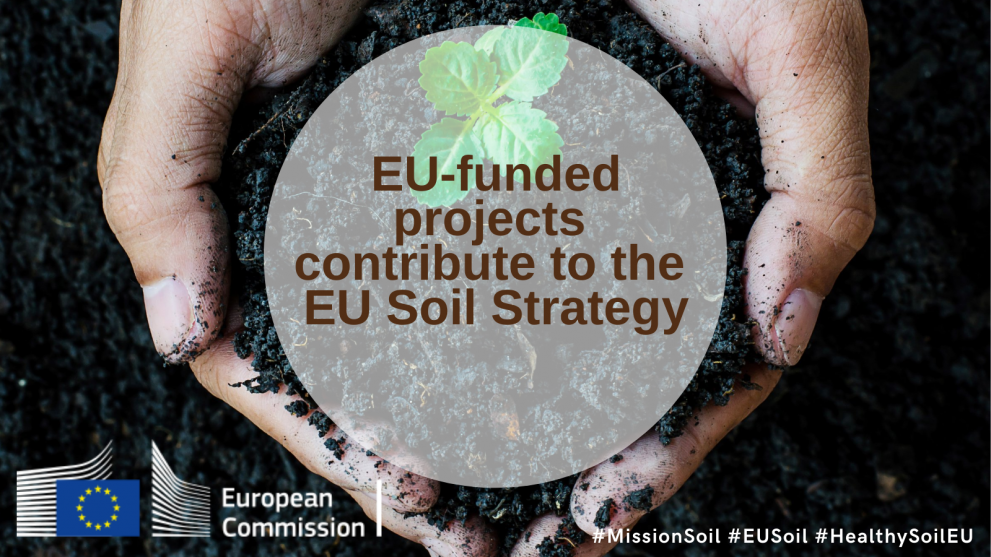
The EU Soil Strategy sets a framework and concrete measures for the protection, restoration and sustainable use of soils, with the vision that by 2050, all EU soils ecosystem will be healthy and more resilient. The Soil Strategy is an important deliverable of the European Green Deal and the EU Biodiversity Strategy for 2030 in facing the climate and biodiversity crises.
The European Research Executive Agency (REA) manages several EU-funded projects that can contribute to this vision. These projects will support the objectives of the EU mission A Soil Deal for Europe, which, will provide EUR 320 million in seed funding through Horizon Europe from 2021-2023. The projects will also help us to learn more about soil, improve its health and help us achieve more sustainable soil management practices. An Info day for potential applicants will take place on 19-20 January 2022.
So, what are the projects that can help revolutionise our knowledge of soil across Europe and the world? Here are some of the projects to watch out for!
MISSION: POSSIBLE?
It’s all in the name, and Soil Mission Support (SMS) is on a mission to help protect our soil and improve soil management in keeping with the EU mission A Soil Deal for Europe. It analyses needs for research and innovation, identifying knowledge gaps and defining a set of strategic criteria for Living Labs and Lighthouses, a crucial element of the mission. SMS is engaging stakeholders from agriculture and forestry, spatial planning, land remediation, climate action and disaster control to aid in analysing the needs and criteria and to improve the coordination of research and innovation on soil and land management.
GUARDING OUR SOIL
Currently, carrying out comprehensive assessments of soil biodiversity is challenging. Soil biodiversity is threatened by land degradation caused by unsustainable soil management practices and climate change. To help us understand more about soil biodiversity, SOILGUARD will assess the status of soil biodiversity and its contribution to the provision and value of soil mediated ecosystem services. All knowledge will be made available in SoilGuardians, an app which will support stakeholders as they work towards sustainable management of their land.
HEALING THE EARTH
TUDI is a global initiative involving 15 partners from across Europe, China and New Zealand who seek to improve health and reverse degradation in agricultural soils. It will include a network of 66 long-term experiments to help farmers to sustainably manage soil . Researchers will identify soil healing strategies and barriers for their adoption and develop a set of digital tools to help farmers find ways to restore soil health, custom-making these approaches to fit local conditions at farm level and addressing farmers’ needs
HELPING OUR FORESTS
HOLISOILS focuses on forest soils processes. Currently, our understanding of forest soil processes is limited, and a lack of harmonised soil monitoring limits the EU’s ability to monitor soil practices effectively and to reach climate policy targets. As its name suggests, Holisoils seeks a holistic way to gain a better understanding of forest soil processes in relation to forest management and to develop tools for soil monitoring correlated with land use, land-use change and the forestry sector.
TACKLING PLASTICS IN OUR SOIL
Plastic use in agriculture has increased hugely in recent decades, resulting in plastic residues including micro and nano plastics being left behind in the soil. These plastics can accumulate in soil and affect different soil functions and ultimately affect plant growth and soil biodiversity. Their precise long-term effects on soil biodiversity are currently unknown.
MINAGRIS aims to contribute to healthy soils in Europe by assessing the impact of plastic debris on agricultural soils. Through 11 case studies across Europe, it will try to gain a better understanding of any potentially damaging consequences to soil biodiversity, soil functions and services at farm and field level. The project will also improve analytical methods of plastics in soils and develop a smartphone app for participative monitoring.
PAPILLONS will provide the first digital European atlas of agricultural plastic use, management and waste production. This atlas will allow to estimate sources of micro and nano plastics in agricultural soils, their behaviour and passage through the soil and their long-term impacts on soil ecosystems and properties. The project will study the effects of traditional and biodegradable polymers in current and future exposure scenarios to assess soil contamination and understand their behaviour and movement in soil and uptake by biota and crops.
Both projects will give recommendations for more sustainable use of plastic in agriculture, to ensure safer food systems in Europe.
READ MORE
Call for experts in soil-related fields to evaluate Horizon Europe project proposals
Question and Answers on Soil Strategy
EU Mission: A Soil Deal for Europe
A Soil Deal for Europe: Mission Implementation Plan
Reaping the benefits of healthy soils for food, people, nature and the climate - CORDIS results pack on soil health
Details
- Publication date
- 25 November 2021
- Author
- European Research Executive Agency
